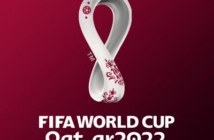
The world’s viewers saw the dictator of misogynist Sauda Arabia and the oligarch of homophobic Russia sit either side of the President of FIFA
Richard Fleming is a veteran corresponding of the BBC having covered World Cups and European Championships. He now works for the Colorado Rapids in MLS as their play by play announcer, and is a regular columnist on Prost.
An ugly scene at the beautiful game
by Richard Fleming
Nothing quite says ‘the beautiful game’ than seeing the president of FIFA sat in between the Crown Prince of Saudi Arabia, Mohammad Bin Salman Al Saud, and the Russian President, Vladimir Putin.
That was the scene viewers were periodically subjected to during the opening match of the 2018 FIFA World Cup, in which the host nation cruised to a 5-0 win, and I must say I felt a little grubby.
Russia introduced a law in 2013 which outlawed the promotion of ‘non-traditional sexual relationships’, viewed as banning homosexuality activism. Whatever your thoughts on a Putin-led Russia as a World Cup host, and whether you feel a summer World Cup in Qatar in 2022 is nonsense, the moral question ought to be considered. (And don’t get me started on Saudi Arabia, where only this month were women allowed to hold a driving license).
Sport is a force for good. Soccer is the world’s game. FIFA’s executives are happy to be seen mingling with heads of state, but I often wonder whether the issue of human rights is ever raised. Can it, and should it, do more to encourage social change?
Is it okay for Qatar to host the event in 2022, handing the tournament to this region of the world for the first time? Some would say the sharing of major events helps spread the growth and nurtures cultural understanding. But, in this case, being able to deliver a sparkling bid document, erect dazzling stadiums, and offer a new face to the footballing family, ought to also come with a leadership and society which reflects the very essence of sport – inclusivity, respect, and equality.
When the first whistle blew in Moscow, not only did it signal the start of the World Cup, but it also ended the years of criticism over Russia as a suitable host. The preceding hullabaloo filled column inches, but bleating and moaning finally made way for the month-long festival of football.
But the issues haven’t gone away.
In the same way that Qatar’s treatment of migrant workers remains a dark stain on that particular nation, and FIFA, there remain concerns over the safety and well-being of gay fans attending the tournament in Russia, as well as how black players and supporters will be treated.
[Column – The Gay Footballer by Adam McCabe]
Soccer’s chiefs are not alone in turning a blind eye to their social responsibilities. China hosted the 2008 Olympic Games. In the weeks ahead of the 2008 Games, the then IOC President, Jacques Rogge, urged Western nations to halt their open criticism of China’s human rights record, preferring quieter diplomacy.
When some hinted at boycotting the Olympics, Rogge sought to wrestle back the high ground, accusing those talking of staying away as hypocrites. He then tried to compare sport with politics and international trade.
He said:
“I call it hypocrisy when I hear a politician demanding a boycott of the Beijing Olympics when he is not even considering for one second calling back his ambassador or ceasing trade and cultural exchanges (with China).”
The fact of the matter is, they can’t have it both ways. On the one hand, sport cannot stand atop a pedestal of principles, while handing powerful political tools to nations of dubious character.
But how quickly our focus shifts. The tournament has started and many of us are guilty of moving on.
I truly hope that racism fails to rear its ugly head, or the hooligans – of all nations – heed the warnings and stay away, and that fans of all backgrounds can witness this spectacle without fear or prejudice.
The hosting of a major tournament should not be handed to those who are simply able to afford it. What price the values we hold so dear?
World Cup
Richard Fleming
Nothing Found
Apologies, but no results were found for the requested archive. Perhaps searching will help find a related post.
![Prost International [PINT]](https://prostinternational.com/wp-content/uploads/2021/08/PINTtFontLogoRoboto1536x78.jpg)


